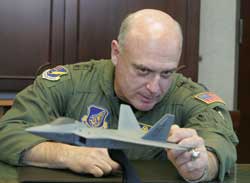| Home | Blog | Ask This | Showcase | Commentary | Comments | About Us | Contributors | Contact Us |

Is the best defense a good offense? Or a good defense?ASK THIS | August 221, 2006James Forest, who teachers terrorism studies at West Point, wonders what more effectively reduces national risk: $3.1 billion for a squadron of F-22 fighters, or $3.1 billion for port security? Second in a series about homeland security. By James JF Forest Q. Should the nation prioritize the offense, as the current administration believes, focusing resources on defeating our terrorist adversaries overseas while proceeding cautiously on expensive security upgrades at home? Or, as Steve Flynn argues, is the saying that “the best defense is a good offense” an excuse for failing to invest enough in critical vulnerabilities such as chemical-site security? Which more effectively reduces national risk: $3.1 billion for a squadron of F-22 fighters, or $3.1 billion for port security? A Council on Foreign Relations task force report published in 2002, America: Still Unprepared, Still In Danger, suggested that “America remains dangerously unprepared to prevent and respond to a catastrophic terrorist attack on U.S. soil. In all likelihood, the next attack will result in even greater casualties and widespread disruption to American lives and the economy.” One focuse of the report was on the homeland security vulnerabilities that exist at the nation’s ports of entry: While 50,000 federal screeners are being hired at the nation’s airports to check passengers, only the tiniest percentage of containers, ships, trucks, and trains that enter the United States each day are subject to examination -- and a weapon of mass destruction could well be hidden among this cargo. Should the maritime or surface elements of America’s global transportation system be used as a weapon delivery device, the response right now would almost certainly be to shut the system down at an enormous cost to the economies of the United States and its trade partners. Steve Flynn, author of America the Vulnerable: How Our Government Is Failing to Protect Us from Terrorism, and one of the nation’s most prominent commentators on homeland security policy, recently called attention to the nation’s lack of focus on improving the security of our critical infrastructure -- our chemical factories, nuclear power plants, power stations, dams, levees, water and sewage systems, railway train systems, and so forth. According to Flynn, “we have to assume that our most critical infrastructures that underpin our economy are becoming increasingly attractive targets for terrorist groups like al-Qaeda.” He notes that port security (or the lack thereof) is one of the most critical vulnerabilities in our homeland security posture. As most observers agree, U.S. border security and port security were not considered high priorities by Congress or the White House prior to 9/11. The primary agencies responsible for security -- the Customs Service, the Coast Guard, and the Immigration and Naturalization Service -- faced severe funding shortfalls for operations and overdue capitalization projects, and their efforts were not integrated by any common strategy, doctrine or information networks. The ever-increasing volume of international trade through our borders and ports, a product of globalization, has led to further challenges for these already overstretched agencies. The U.S. Coast Guard is working hard to protect the nation’s ports, ships, and commuter ferries from a terrorist attack. New maritime safety and security teams -- called Sea Marshals -- are highly trained to respond to a situation at a moment’s notice. On some missions, they board cruise ships to observe passengers, along with their luggage and cargo coming onboard. Coast Guard enforcement officers also screen crewmembers onboard foreign vessels coming into port. They check their passports to see if they might be on a terrorist watch list and do interviews asking them about their last ports of call. In addition to its expanded anti-terrorism mission, the Coast Guard is still fulfilling its traditional duties such as ensuring safe coastal navigation and search and rescue missions. However, as several media services have reported over the past few years, the Coast Guard’s ships, planes and helicopters are breaking down at record rates, which may threaten the service’s ability to carry out its post-9/11 mission of protecting ports and waterways against terrorism. Key members of Congress, maritime security experts and a former top Homeland Security Department official have all indicated that the fleet is failing and that plans to replace the Coast Guard’s 88 aging cutters and 186 aircraft over the next 20 years should be accelerated. Some ships are more than 50 years old, well beyond the recommended age for replacement. Further, on 9/11 the entire U.S. Coast Guard was a smaller force than the New York City Police Department, significantly hampering our nation’s ability to secure our ports. As U.S. Coast Guard veterans Joe DiRenzo and Chris Doane have recently observed, “securing a target-rich maritime domain, highly sensitive to disruption, and open to a wide range of potential methods of exploitation and attack by a covert enemy is like looking for a needle in a stack of needles.” It has only been in the past few years that we have seen a substantial commitment by our nation’s leaders to address these challenges.
|
||||||||||||




